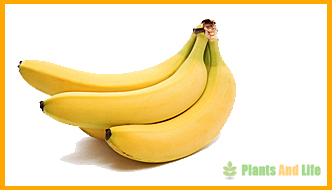
The banana is the fruit or berry derived from the inflorescence of the banana tree. Only the fruits of wild bananas and some domestic cultivars contain seeds.
Bananas are an essential element of the diet in certain regions [Which ones?], Such as in Uganda, which would offer around fifty varieties of this fruit.
The plant
Although the banana tree can reach a relatively large size (9 meters), it is not a tree. Indeed, it does not form a woody trunk. The pseudo-trunk is actually formed by the petioles of the leaves. These partially overlap and constitute a bearing structure, a "false trunk". The petioles have at their end a large elongated limb with a midrib in the center. The banana stem is very short and entirely underground. It appears on a rhizome, which regularly produces new stems. The rhizome carries a large mass of long, fine roots, located just below the soil surface.
Consumption
In producing countries, dessert bananas and plantains are an important food resource for more than 400 million people in tropical countries of the planet. Globally, bananas and plantains are the fourth basic foodstuff, behind rice, wheat, and corn. Two other major advantages make bananas a vital food element in many poor rural areas: its high nutritional value (rich in vitamins A, C and B6, for example), and its production without interruption throughout the year.
In importing countries, even if the food security of consumers does not depend on the availability of bananas, the fruit is on the shelves all year round. In 2003, according to the FAO, the Swedes consumed 19 kg per inhabitant per year, the Danes, 14 kg, and the Norwegians, 13 kg.
Bananas are the third fruit consumed in France (market share in 2010: 12.2%) behind apples (22.6%) and oranges (12.3%).
A banana that can be eaten with the skin was developed by a Japanese food company. This banana, called "Mongee", was born from scientists at D&T Farm.
The banana flower (babafigue) is also consumed for example in Reunion as an accompaniment to the carry.
Alcoholic drinks
Banana or kasiksi beer is a fermented drink traditionally produced and consumed in eastern Africa.
A Canarian company produces banana wine grading 12 ° as well as vinegar.
You can make your own banana liqueur or buy it commercially.
Nutritional value
There are three main types of bananas from a food point of view: dessert bananas, cooking bananas (among which plantains occupy a prominent place) and beer bananas (in Africa banana beer (kasiksi) from artisanal or industrial productions).
The banana is a very energetic fruit (90 kilo calories / 100 g) and very rich in potassium, which it can cover the daily needs. Nutritious, easy to digest, it is rich in carbohydrates, phosphorus, calcium, vitamins A, B and C. Its iron intake is low (less than 5% of the daily intake for an adult man) and it is non-heme iron which is poorly absorbed. Its taste is due to isoamyl acetate. It is also sold in the form of nectar.
The banana glycemic index is quite high when it becomes very ripe. Its caloric intake is 93.6 per 100 grams.
Other use
Milena Rodrigues Boniolo has tested banana peel powder as a filtration medium for heavy metals or radionuclides from the nuclear industry in water, and fertilizer plants (cadmium, a natural contaminant of phosphates). This powder added to the highly mixed water for 40 minutes extracts about 65% of the heavy metals, the operation can be repeated. Its negative charge allows it to fix positive metal ions.

